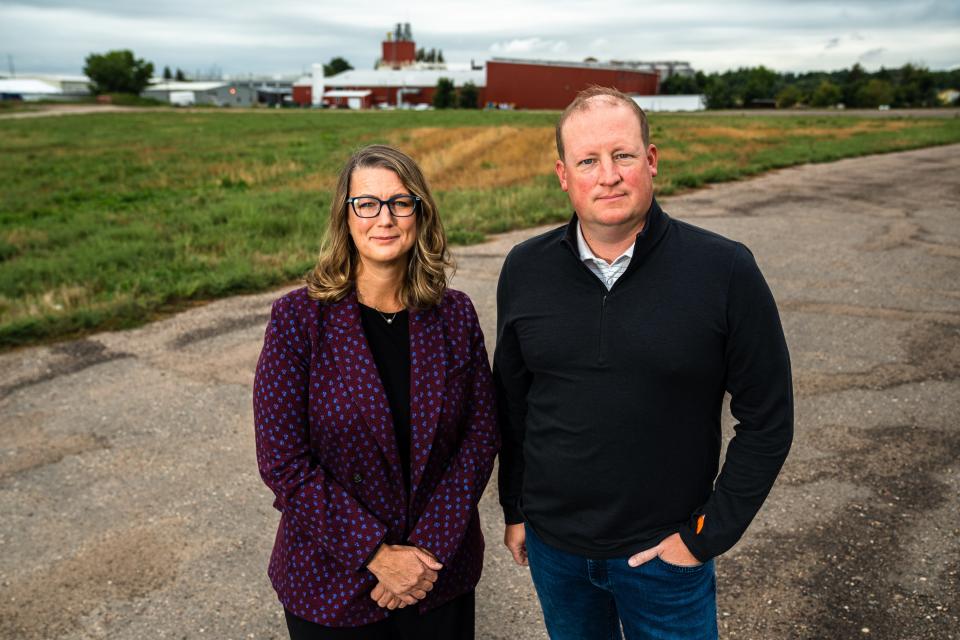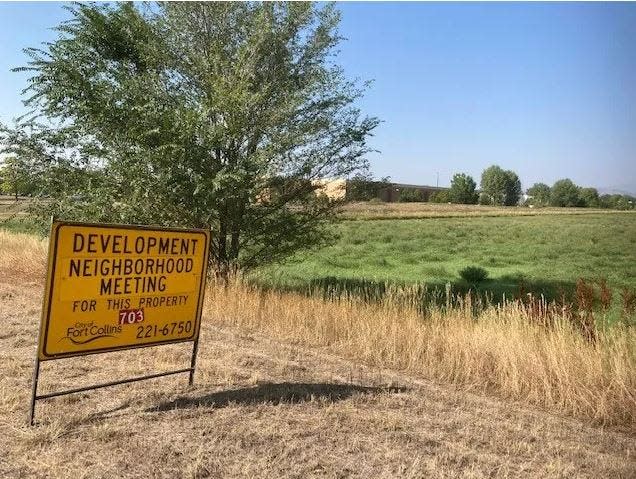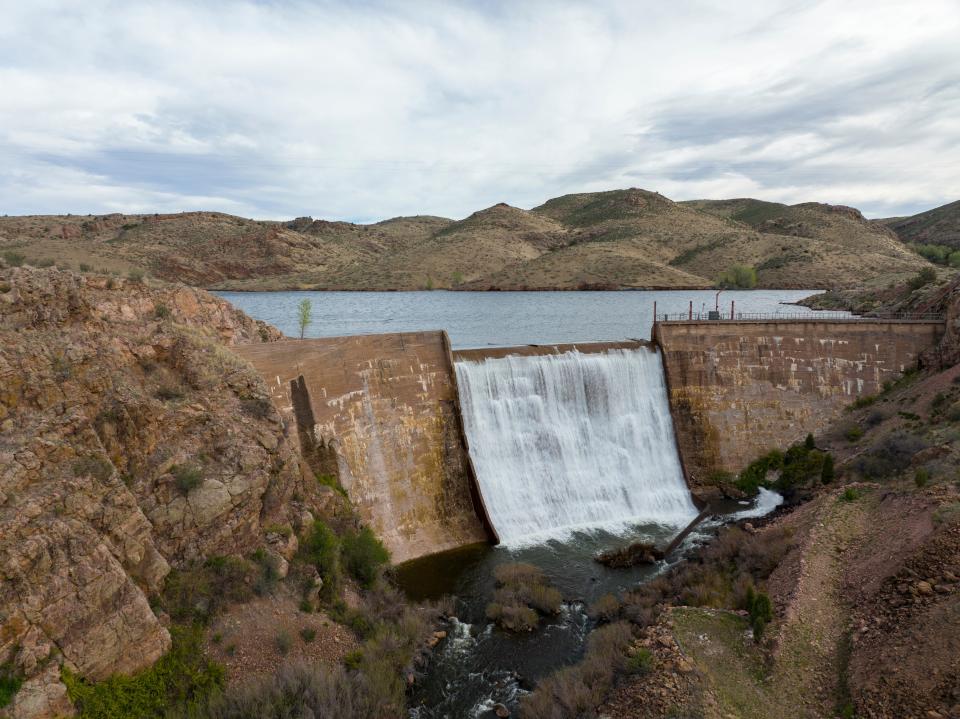Developers warn Fort Collins' planned water fee hike will raise home prices even further
More than just bricks and sticks go into the cost of building a home. There's land, streets, sidewalks, material, labor, city permits and, Colorado's most critical element: water. Before any shovels go in the ground, before any homes are sold, developers have to prove they have all the water they need for their future homeowners.
As water becomes more scarce and expensive, Fort Collins Utilities has proposed increasing the fee developers pay to hook into its water supply from $68,200 per acre-foot to $179,500. It's an increase that will add about $35,000 to the cost of building a new single-family home in the city. Opponents say the planned 160% increase is exorbitant, will further exacerbate Fort Collins' housing affordability issues, drive builders outside city limits where water is cheaper and tamp down business expansion.
The city utilities department, which pitched the idea to city council in August, says the increase is needed to buy and store up to an additional 500 acre-feet of new water and ensure the growing city maintains a safe and reliable water source. Failure to raise fees now will only make the city's water more expensive later on as the cost of buying water rights continues to rise, utilities leaders said.
An acre-foot of water can supply water to three to four single-family homes in Fort Collins per year. Adding another 500 acre-feet to the city's already plentiful supply could serve 1,500 to 2,000 new single-family homes.
"Water drives everything in Northern Colorado," said Ann Hutchison, president and CEO of Fort Collins Area Chamber of Commerce, which is lobbying the city to reduce the potential increase. "We see this as an affordable housing issue and an economic driver issue," she said.
Following its work session with city council the utilities department paused the potential increases until it can have more conversations with developers, Realtors, affordable housing advocates, employers and other stakeholders. If council adopts new rates next year, they would likely go into effect in January 2025.
The proposed fee increase would apply to new commercial and residential development and redevelopment within Fort Collins' water utility service area. It would not affect developers who get their water from other local water districts including ELCO or Fort Collins-Loveland Water District, or projects that have already been approved.
City council members, many of whom were seeing the proposed increases for the first time, wanted more time to study the numbers and their potential impact. "It seemed to come out of nowhere," said councilmember Kelly Ohlson. "I'm always the one that's supporting appropriate fees and this process seemed a little wanting and a little rushed. They've gotta make their case."
The city last raised its water supply requirement fees in 2022, a comparatively modest 60.4% jump that increased rates from $42,518 to $68,200 per acre-foot of water.
According to city officials, rates should be reassessed every two years. There are currently 821 developers in some phase of the development review process that could be financially impacted if they can't secure and pay for water ahead of the rate increase, the city said.
For local developers, buying and stockpiling water is economically impossible, said Jason Sherrill, president of Landmark Homes, which is building the Northfield neighborhood northeast of Vine Drive and Redwood Street, along with the proposed Union Park, a 640-unit development at Ziegler and Corbett roads.
While Northfield is under construction and has the water it needs, Union Park does not, Sherrill said. Landmark may have to decide whether the project is feasible under a new set of fees, "or does this force us to sell the property because we're not in a position to finish?" he said.

"It's frustrating for us as builders," said Sherrill, whose company builds a large number of condos and townhomes, considered a lower-cost entry into home ownership. Raising water fees will add an additional $20,000 to $30,000 to the cost of one multifamily unit, the company estimated.
"We are doing our best to deliver affordable and attainable housing. Why would the city do something like this? To me it feels like this is a slow-growth or no-growth initiative," Sherrill said.
Hartford Homes — which plans to develop affordable homes with Habitat for Humanity alongside market-rate housing on vacant land north of Odell Brewing Co. — estimated the fee hike could add $55,000 to the cost of a new single-family home and threaten the project's planned affordable units.
"We are in the process of quantifying that, but we believe it will double the cost of water, two to 2.5 times more," said Patrick McMeekin, president of land for Harford Homes.
"We haven’t begun to evaluate how we will deal with it, but we will either have to build more expensive homes or increase the cost of the affordable units," he said. "Everyone just wants to understand what is proposed and why is the timing for this right now."
It's not just homebuyers who will feel the impact, said Ryan Schaefer, CEO of NAI Affinity and chairman of the chamber's board of directors. Schaefer estimated the proposed water rate increase would add about $3 million to the cost of building a 255-unit apartment complex, or $12,000 per unit.
That means rents would have to increase about $100 a month to make up the difference and a renter would need an additional $4,000 in income to qualify for the same apartment as today, based on the generally accepted formula of rents not exceeding 30% of a person's income, he said.
"The real numbers are staggering," Schaefer said. With rising interest rates and potentially the cost to buy water, rents and cost of new homes will go up. "Otherwise, developers just won't build" within Fort Collins' core area.
If the supply of new construction decreases, the cost of new homes will surely rise and sellers of existing homes will take note, increasing their sale prices accordingly, Schaefer said.
Who would pay Fort Collins' higher proposed water tap fee?

According to a 2017 Fort Collins City Plan trends and forces report, about 25% of new development that will occur within the city's growth management area will be served by city water utilities. The remaining 75%, including all of Montava in northeast Fort Collins and Bloom, northwest of Mulberry, would be served by other water districts.
To ensure they have enough water for their projects, developers in Fort Collins are required to provide 0.31 acre-feet of water per four-bedroom, single-family home, which equates to about $53,850 per home.
By comparison, the total fee for an average single-family residential water tap in the Fort Collins-Loveland Water District, which includes the water resource fee of $48,000, an infrastructure plant investment fee of $13,021, and a water meter fee of $380, for a total fee of $61,401 for an average single-family residential home.
Increased water supply requirement fees will also affect businesses that want to expand and use more water as they grow.
Realtor Jason Ells, senior director of Cushman Wakefield real estate, said he's working with a local restaurant owner who's looking to convert a retail space to restaurant use.
"The cost of increasing the water allocation for this conversion is high enough already ... what the city proposed would take that cost to upward of $180,000. That’s a lot of cheeseburgers," Ellis said. "This is not new development; not growth management; it is penalizing an existing, locally owned business trying to grow and stay relevant in a very competitive local market."
According to city estimates, a 4,000-square-foot restaurant with a three-quarter inch water meter would require 1.76 acre-feet of dedicated water at a current cost of about $120,000. Under the proposed fee, that tap fee would increase to $315,916.
If the increase goes through, the water supply requirement fee would account for 8.3% of the cost of a $670,000, four-bedroom home, up from 3.2% today.
Fort Collins' water portfolio is robust and valuable

The proposed tap increase was determined using the same market-based approach the city has used for years in pricing its water, Jason Graham, Fort Collins' director of water utilities, said. It requires developers or new users to pay fair market value for the water they buy from the city for their businesses or projects.
The water supply requirement fee calculation includes the cost of future infrastructure such as the Halligan Reservoir expansion that will increase the system's storage capacity, the market value of existing water rights and market value of expected future water rights acquisitions.
With the value of the city's water portfolio soaring from $3 billion to $5 billion in the past two years, the proposed increase is in line with fair market value, said Jason Mumm, a consultant from FCS Group, hired to evaluate the water supply requirement methodology and fee.
The total cost is divided by the firm yield — the amount of water the city can depend on assuming a 50-year drought — of water in the city's water rights portfolio. That results in a cost of $179,500 per acre-foot to serve future development, according to the city.
"If developers are not required to pay the market cost of the water rights and infrastructure needed to provide service for future customers, these costs would inequitably fall on existing customers," Graham told council.
Mayor Jeni Arndt and other council members questioned the timing and size of the increase when the city already owns "a very large portfolio" of water, isn't immediately buying more water and has ample supply to accommodate growth for the near term.
"This is a huge jump when we have not incurred more costs," she said. "It's hard to raise rates when our costs haven't gone up. It seems like an interesting thing for a government to do. Government isn't the private sector and I just don't know that we always do market-rate pricing. It's hard to take."
Charging fair market value is a "philosophical approach" that asks people to buy in based on the value of the water, not on what it costs the city to buy the water, City Manager Kelly DiMartino told council in August.
Many neighboring communities link their water rates to the cost of buying Colorado-Big Thompson Project shares, which have increased 52 times what they were 30 years ago, the utilities department said in an evaluation of C-BT shares.
"As C-BT shares go up (other communities') costs will go up in tandem," Mumm said. "You won't be able to acquire water for anything less."
Graham couldn't say when the city might need more water, or if it will need the full 500 acre-feet it is estimating. It depends on conservation methods, the city's rate of growth and available storage. Currently, the city has more water than it can store until Halligan Reservoir is expanded. "Now, we let water go through, but we will still need water rights if Fort Collins hits its projected population," which is estimated to reach 255,000 in about 2060.
"Water scarcity is very real," notwithstanding this year's wet summer, he said. "Scarcity, the market, all those factors come into play when people like me are planning for how to manage our water resources, our water supply in the future and the growth of Fort Collins ... it's complicated but very real. Water is not getting any cheaper."
Fort Collins grapples with how to value a water portfolio

The chamber's Hutchison takes issue with tying the water supply fees to the value of Fort Collins' water portfolio when the city won't ever sell its valuable water rights.
"If they're never going to sell, is it fair to charge that value to something new coming into the community?" she said. "There's a difference between the capital market and the government market, and that context wasn't necessarily provided in the first round" of discussions.
"We all agree there has to be some change, but where we're at now feels like too far," Hutchison said. "Single-family homes are important and we need to increase those, but the reality is the majority of affordable products are going to be multifamily."
If building apartments and multifamily units is the city's solution to affordable housing, "then overnight we have eliminated any possible success in that affordable space," she said.
For the next several months, the city utilities department will be hosting stakeholder meetings before it brings a new recommendation to council in the first half of next year, Graham said.
The recommendation is based on the recognition that development going forward needs to pay an equitable share of what previous entities paid, he said. "We always look at fair market value, but fair market value went from under $100,000 per acre-foot and now it's hit a level where it's raising eyebrows. Now the conversation is how can we look at it, should we look at it differently given the landscape of Northern Colorado?"
Local developers worry they'll be driven outside city limits

Much of Fort Collins' growth is already happening outside Fort Collins Utilities' water service area, as developable land becomes more difficult to find and more expensive to buy, said Landmark's Sherrill.
Land in Fort Collins is already more expensive, the entitlement process takes longer, regulations are more cumbersome than any other city in Northern Colorado, but "builders are willing to go there because that's where people want to go and water is a little cheaper," he said. "This is going to drive builders from Fort Collins ... not only will home building slow down, whatever does happen will be so expensive and will drive up the costs of all homes. Some may see that as beneficial, but for others wanting to buy in Fort Collins it will be impossible."
Larger, national builders have a financial advantage over local builders and can be more aggressive finding and stockpiling water so they can be more competitive in the marketplace, Sherrill said. But that's not possible for smaller, local builders who already have "hundreds of thousands of dollars, if not millions" tied up in the development process, he said. "This adds another huge headwind that we have to go through."
Halligan expansion holds the key to future water storage

The Halligan Reservoir expansion project, which has taken three times longer than anticipated and is expected to cost twice as much as original projections, is currently in the permitting phase and on track to be operational in 2029. The anticipated cost of expanding the reservoir northwest of the city is now about $308 million
When it's completed, it would add 8,200 acre-feet of water storage for Fort Collins Utilities and would be filled with water from the Poudre River. The city plans to build a replacement dam about 200 feet downstream from the existing dam on the North Fork of the Poudre River about 24 miles upstream of Gateway Natural Area.
Graham told city council the water supply requirement fee needs to increase regardless of Halligan, which represents about 8% of the city's total water portfolio value.
Coloradoan reporter Sady Swanson contributed to this report.
Fort Collins' water supply, by the numbers
$179,500: Proposed city water supply requirement fee per acre, up from $68,200
$55,645: Proposed city fee for typical four-bedroom, single-family detached home; 5,200 square feet of outdoor space and 101,000 gallons used per year. An increase from $21,140
$5 billion: Estimated value of Fort Collins' current water portfolio, up from $3 billion two years ago
326,000 gallons: The number of gallons in one acre-foot of water, enough water to cover a football field 1-foot deep.
1 acre-foot of water: Can supply a year's worth of water to three to four single-family homes in Fort Collins.
Source: City of Fort Collins
Where Fort Collins residents get their water
Here's a breakdown of how many people get their water from each provider serving city residents, and where each provider gets its water:
Fort Collins Utilities serves about 137,000 residents, with most of its water coming from Horsetooth Reservoir.
Fort Collins-Loveland Water District serves about 24,000 residents, with 10% of the water coming from Cache la Poudre River and 90% from the Colorado-Big Thompson.
East Larimer County Water District serves about 11,000 residents, with 30% of the water coming from Cache la Poudre River and 70% from the Colorado-Big Thompson.
Source: Fort Collins Utilities, Fort Collins-Loveland Water District, East Larimer County Water District
This story has two corrections. The expected date of completion of Halligan Reservoir's expansion is 2029. The cost of water from Fort Collins-Loveland Water District has been updated.
This article originally appeared on Fort Collins Coloradoan: Fort Collins' planned water fee hike spurs affordability concerns

